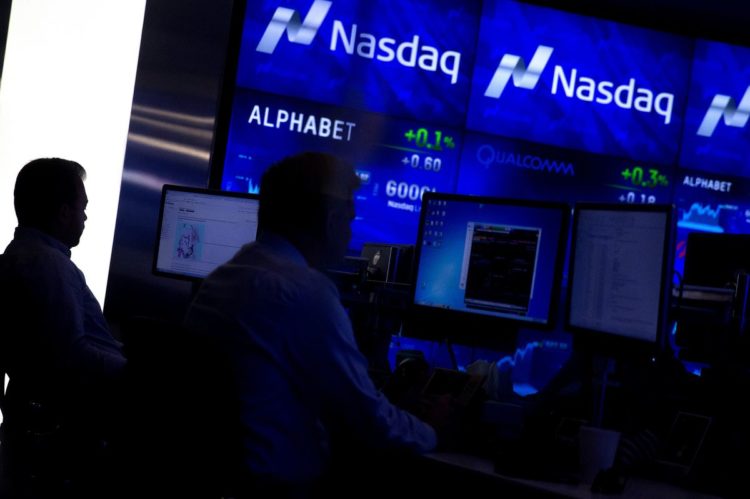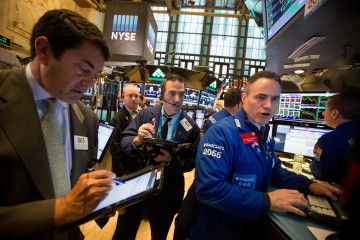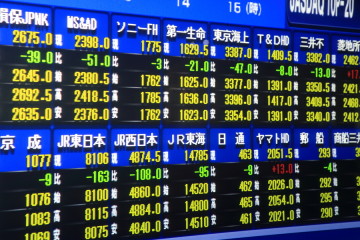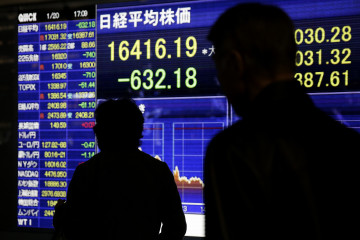U.S. Stocks Sink Most Since May, Treasuries Slide: Markets Wrap

(Bloomberg) —U.S. equities fell the most in six weeks and a measure of market volatility spiked higher as investors grew uneasy amid a global cyberattack and a fresh setback to the Republican agenda in Washington. Treasuries plunged as Janet Yellen signaled the economy is robust enough to withstand higher interest rates.
The Nasdaq 100 Index fell more than 1.7 percent to its lowest level since May 19, as investors continue to punish some of the year’s highest flyers and Alphabet Inc. got hit with a record antitrust fine in Europe. Selling accelerated as the Federal Reserve chair said some financial assets had become “somewhat rich” and Senate Republicans delayed a vote on health-care reform in a fresh hit to the Trump administration’s policy agenda, fueling speculation tax cuts and regulatory rollbacks may also take longer than anticipated.
“Market participants may view health care legislation as stalling a move on taxes that could include a repatriation tax holiday,” said Jeffrey Kleintop, Charles Schwab Corp.’s chief global strategist.
Yellen’s comments that the Fed remains on track to tighten even as economic data continues to fall short of estimates sent Treasury 10-year yields to the highest in two weeks. Financial shares advanced, but not enough to save the S&P 500 Index from its worst drop in six weeks. The CBOE Volatility Index jumped 12 percent. Yellen couldn’t boost the dollar though, as the greenback retreated to the lowest level in 10 months versus the euro after Mario Draghi said inflation in the region wouldn’t remain low.
Some investors worry the Fed is taking too rosy a view as it sets the path for increasing borrowing costs, especially after weakness in data Monday added to concerns about the strength of growth. The International Monetary Fund sounded a similar alarm earlier Tuesday, cutting its growth forecast for the U.S. in part because of policy uncertainty. The latest cyberattack to disrupt global business didn’t disrupt financial markets in any noticeable way, but added to the cautious mood.
“Yellen is expressing confidence that banking is stronger, economic growth is relatively firm and there’s not going to be a crisis in our lifetime,” said Dennis Debusschere, Evercore ISI’s head of portfolio strategy and quant. “It’s sending a signal that they can continue on rising rates, despite the weaker inflation we’ve seen. That’s where the concern is in the market.”
Here are some important upcoming events:
China’s PMI might have declined in June after unexpectedly remaining unchanged in May, reflecting government offers to cut overcapacity and leverage. That reading is due Friday. Also due this week: Japanese inflation, factory output, unemployment, household consumption and housing starts; rate decisions in Colombia, the Czech Republic and Armenia.
These are the main moves in markets:
Stocks
The S&P 500 lost 0.8 percent to 2,419.38 at 4 p.m. in New York. That’s the lowest since May 31. The Nasdaq 100 dropped 1.8 percent, the most since a 2.4 percent rout on June 9. The index is at its lowest level since May 19. Alphabet Inc. dropped 2.5 percent after being hit with a record EU fine. The Stoxx Europe 600 Index dropped 0.8 percent, as declines in travel and leisure shares overshadowed the rally in miners.
Currencies
The euro surged 1.4 percent to $1.1336. The Bloomberg Dollar Spot Index fell 0.5 percent after gaining 0.1 percent in the previous session. The British pound added 0.6 percent to $1.2799.
Commodities
West Texas Intermediate crude rose 2 percent to settle at $44.24 a barrel, for a fourth day of gains that is the longest run in a month. Oil fell into a bear market last week. Gold futures increased 0.3 percent to $1,250.40 an ounce. The precious metal sank almost 1 percent on Monday.
Bonds
The yield on 10-year Treasuries rose six basis points to 2.20 percent, after dropping less than one basis point on Monday. European government bonds dropped across the board, with the yield on benchmark French bonds climbing 14 basis points and that of Germany gaining 13 basis points.
Asia
The Chinese yuan jumped both onshore and overseas amid speculation of central bank intervention. Hong Kong’s Hang Seng index fell 0.1 percent and the Shanghai Composite Index advanced 0.2 percent. A string of small-cap Hong Kong stocks suddenly plunged during the day, with traders pointing to links between some of the companies and a brokerage that’s under regulatory investigation. Japan’s Topix climbed 0.4 percent to the highest closing level since August 2015.
–With assistance from Ven Ram and Dani Burger.
To contact the reporters on this story: Jeremy Herron in New York at jherron8@bloomberg.net ;Dani Burger in New York at dburger7@bloomberg.net To contact the editors responsible for this story: Jeremy Herron at jherron8@bloomberg.net ;Christopher Anstey at canstey@bloomberg.net Eric J. Weiner







No Comment